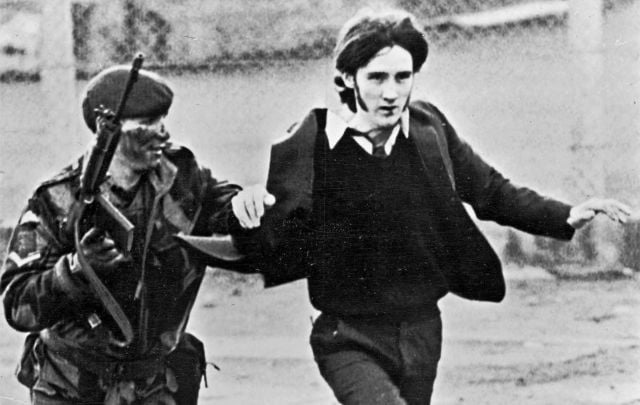The 50th anniversary of Bloody Sunday is this Sunday, January 30.
On that day in 1972, British soldiers shot 26 unarmed civilians in Derry, Northern Ireland during a protest march against internment without trial organized by the Northern Ireland Civil Rights Association (NICRA).
13 people were killed in Derry that day by British forces. They were:
- Patrick Doherty, age 31
- Gerard "Gerry" Donaghy, 17
- John "Jackie" Duddy, 17
- Hugh Gilmour, 17
- Michael Kelly, 17
- Michael McDaid, 20
- Bernard "Barney" McGuigan, age 41
- Kevin McElhinney, 17
- Gerard "Gerry" McKinney, 35
- William McKinney, 26
- William Nash, 19
- James "Jim" Wray, 22
- John Young, 17
Another person, John Johnston, 59, died later on June 16, 1972. His death was attributed to the injuries he sustained in Derry on January 30.
Two days after the events on January 30, the Widgery Inquiry was launched by British Parliament. Completed within ten weeks and published within eleven weeks, the report ultimately supported the British Army's account of the events of the day.
However, in January 1998, a second commission of inquiry was established to re-examine the events of Bloody Sunday. Its 5,000-page report, published in 2010, concluded that “The immediate responsibility for the deaths and injuries on Bloody Sunday lies with those members of Support Company whose unjustifiable firing was the cause of those deaths and injuries."
Further, the report found: "The firing by soldiers of 1 PARA on Bloody Sunday caused the deaths of 13 people and injury to a similar number, none of whom was posing a threat of causing death or serious injury."
Responding to the Saville report, then-Prime Minister David Cameron said: “There is no doubt, there is nothing equivocal, there are no ambiguities. What happened on Bloody Sunday was both unjustified and unjustifiable. It was wrong.”
In the wake of the Saville Report, the Police Service of Northern Ireland launched a murder investigation. In 2019, the police force announced that there was enough evidence to prosecute "Soldier F" for the murders of James Wray and William McKinney, as well as five attempted murders.
In September 2020, Northern Ireland's Public Prosecution Service (PPS) ruled that there would be no charges against any other Bloody Sunday soldiers.
In July 2021, the Public Prosecution Service announced that Soldier F would not face trial as there was no longer a reasonable prospect of securing a conviction. Not long after, Colum Eastwood, MP for Foyle and leader of the SDLP, named Soldier F in the House of Commons. Eastwood said: "He has been afforded anonymity for 50 years. The British government want to give him an amnesty now. This can't be allowed to stand."
That same month, Northern Ireland's Secretary of State Brandon Lewis put forward a paper which, in part, proposed a statute of limitations to apply equally to all Troubles-related incidents.
50 years after Bloody Sunday, we want to know, do you think the British forces should be prosecuted for the events on January 30, 1972?
Create your own user feedback survey




Comments